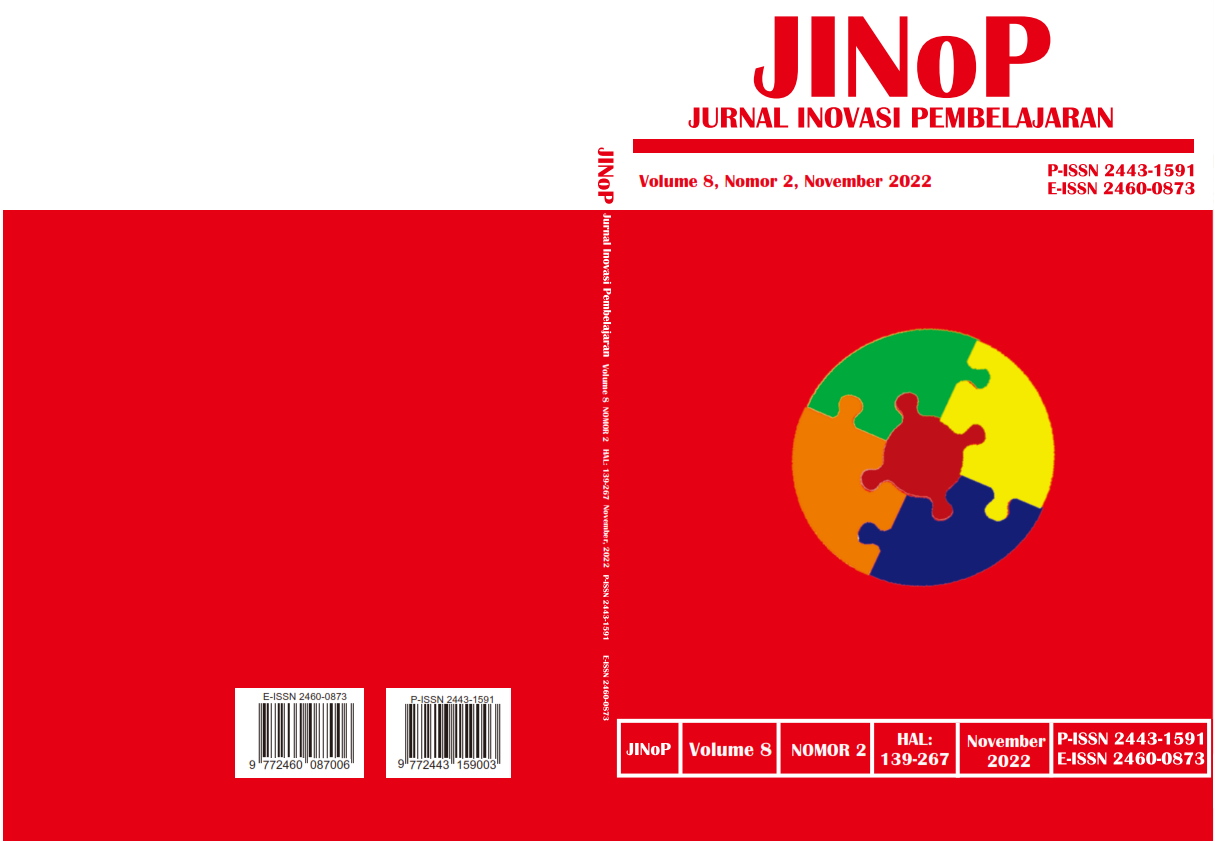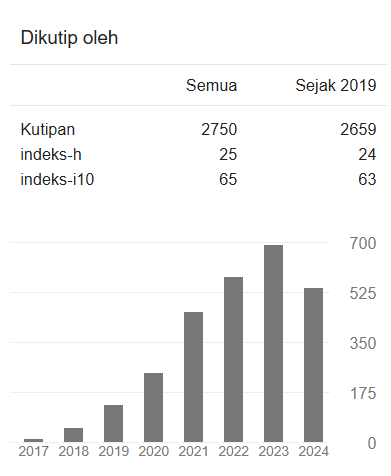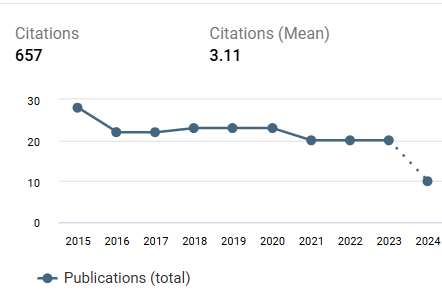Kahoot! Sebagai Inovasi Evaluasi Hasil Belajar Siswa Yang Efektif Dan Menyenangkan
DOI:
https://doi.org/10.22219/jinop.v8i2.21384Keywords:
kahoot, Evaluation of learning outcomes, EffectivenessAbstract
Student learning outcomes became an important part of decisions making about planning and implementing future learning. In general, the evaluation tools put the students under stress and lead to failure to achieve minimum graduation competencies. Kahoot! is one of the applications that can be used as an innovation in evaluation of student learning outcomes. The purpose of this study is to analyze the effectiveness and level of student acceptance of Kahoot! as a platform for evaluating Economics subject learning outcomes at SMA Negeri 1 Gemuh class X IPS. Respondents involved in the study were students of class X IPS 1 as the experimental class and class X IPS 2 as the control class, each class totaling of 30 students, at SMA N 1 Gemuh, Kendal Regency, Central Java. Data were taken through tests and in-depth interviews. The test result data were analyzed descriptively quantitatively. Analysis of interview data using an interactive model, namely data reduction, data display, and drawing conclusions. The results showed that the Kahoot! effective as a platform for evaluating economic learning outcomes. Kahoot app! is an innovation in evaluating learning outcomes that are more enjoyable.
Downloads
References
Alfansyur, Andarusni dan Mariyani. (2019). Pemanfaatan Media Berbasis ICT “Kahoot dalam Pembelajaran PPKN untuk Meningkatkan Motivasi Belajar Siswa. Jurnal Bhineka Tunggal Ika, 6 (2), 208-216.
Arifin, Faizal. (2020). Persepsi Mahasiswa terhadap Penggunaan Kahoot sebagai Media Pembelajaran di Stiabi Riyadul’ulum. Prosiding SENA 2020. hal 8-18.
Bahar, Herwina., Dewi, S., Laily, N., Linda, A. (2020). Efektifitas Kahoot Bagi Guru dalam Pembelajaran di Sekolah Dasar. Jurnal Pengabdian pada Masyarakat, 3 (2), 155-162.
Budiman, Muhammad Raihan. (2022). Inovasi Pendidikan dan Urgensinya dalam Menghadapi Pendidikan di Era Teknologi Informasi.
Daryanes, Febblina dan Deci Riren. (2020). Efektivitas Penggunaan Aplikasi Kahoot sebagai Alat Evaluasi pada Mahasiswa. Journal of Natural Science and Integration, 3 (2), 172-186.
Fahlevi, Pahri dan Athanasia Octaviani Puspita Dewi. (2019). Analisis Aplikasi iJateng dengan Menggunakan Teori Technology Acceptance Model (TAM). Jurnal Ilmu Perpustakaan, 8 (2), hal 103-111.
Fajriyyah, afiyah Al dan Meida Nugrahalia. 2020. Efektivitas Aplikasi Kahoot sebagai Alat EvaluasiKognitif pada Materi Sistem Pencernaan Manusia. Jurnal Pelita Pendidikan, 8 (4), 224-229.
Firdiansyah, Yhadi dan Heni Purwa Pamungkas. (2020). Analisis Persepsi Mahasiswa terhadap Penggunaan Kahoot sebagai Media Evaluasi Pembelajaran pada Mata Kuliah Teori Ekonomi Moneter. Jurnal Ekonomi dan Pendidikan 4 (1), 1-7.
Izzati, Musrohul dan Heri Kuswanto. (2019). Pengaruh Model Pembelajaran Blanded Learning berbantuan Kahoot terhadap Motivasi dan Kemandirian Siswa. Jurnal Pendidikan Informatika, 3 (2), 68-75.
Luthfi dkk. (2020). Evaluasi Penggunaan Aplikasi Kahoot pada Pembelajaran di Sekolah Dasar (SD) pada Guru. International Journal of Community Service Learning 4 (3),186-191.
Mamonto, Nenta dkk. (2021). Penggunaan Media Kahoot dalam Penilaian Pembelajaran Mengevaluasi Struktur dan Kebahasan Teks Anekdor pada Siswa Kelas X SMK Negeri 1 Suwawa. Jambura Journal of Linguistics and Literature, 2 (1),1-14.
Masyrufin, Arief. (2022). Pengembangan Game Kahoot sebagai Media Evaluasi Hasil Belajar Siswa. Jurnal Inovasi Pendidikan Berbantuan Teknologi, 2 (1), 64-74.
Moleong. (2017). Metodologi Penelitian Kualitatif. Bandung: PT Remaja.
Mohammad, Marwah marian dan Prima Mutia Sari. 2021. Efektivitas Kuis Interaktif Aplikasi Kahoot dalam Pembelajaran IPA di Sekolah Dasar. Jurnal Educatio, 7 (3),1194-1198.
Nana, Sukmadinata. (2012). Metodologi Penelitian Pendidikan. Bandung: PT Remaja Rosdakarya.
Pasanda, Erna,. Andi, K dan Kartini. (2020). Technology Accepted Model pada Penggunaan Teknologi dalam Proses Pembelajaran Akuntansi, Paulus Journal of Accounting (PJA), 2 (1), 31-39.
Permatasari, Carolina Lita dan Sucihatiningsih Dian Wisika Prajanti. (2018). Acceptance of Financial Accounting Information System at Schools Technology Acceptance Model. Journal of Economic Education, 7 (1), 109-120.
Purwaningtyas, L, F, D., Aris Efendi dan Aisyah, T, S. (2021). Respon Siswa dalam Penggunaan Media Evaluasi Quizizz pada Kelas X Lintas Minta Geografi SMA N 1 Kauman Tulungagung. Jurnal Geoedusains, 2 (2), 210-128.
Putri, Aghita Citra Rediza dan Athanasia Octaviani Puspita Dewi. (2020). Analisis Penerimaan Aplikasi Isalatiga untuk Pemustaka di Dinas perpustakaan dan arsip Kota Salatiga. Jurnal Ilmu Perpustakaan, 9 (1), 1-11.
Putri, A. R., & Muzakki, M. A. (2019). Implemetasi Kahoot Sebagai Media Pembelajaran Berbasis Digital Game Based Learning Dalam Mengahadapi Era Revolusi Industri 4.0. In Prosiding Seminar Nasional Universitas Muria Kudus (pp. 1-7).
Rohman, M, As, Ari, Abd dan Wahyu, M, L. (2022). Efektifitas Penggunaan Aplikasi Quizizz dalamEvaluasi Pembelajaran Daring Ilmu Pengetahuan Alam (IPA) Materi Macam-Macam Gaya Kelas IV MI AL Ihsan Damasri. Jurnal Muasiss Pendidikan Dasar, 1 (1), 31-39.
Srinadi, N, L, Putri dan Ni Nyoman, H, P. (2017). Implementasi Technology Acceptance Model pada Penggunaan Metode Pembelajaran BerbasisTeknologi Informasi. E-Prosiding KN&I STIKOM bali, 170-174.
Sugiyono. (2017). Metodologi Penelitian. Bandung: Alfabeta.
Surani, D. (2019). Studi Literatur: Peran Teknolog Pendidikan Dalam Pendidikan 4.0. Prosiding Seminar Nasional Pendidikan FKIP, 2 (1), 456–469
Sururoh, Lin. (2020). Kahoot Sebagai Inovasi Pembelajaran dan Evaluasi Siswa (studi literatur). Prodiding Seminar Nasional Pendidikan Program Pascasarjana Universitas PGRI Palembang.
Tileng, Kartika Giani. (2015). Penerapan Technology Acceptance Model pada Aplikasi Edmodo di Universitas Ciputra Surabaya Menggunakan Analisis Jalur. JUISI, 1 (1) 28-37.
Waruru, F, T., Bister, P., dan Dito, P, U. (2020). Pemanfaatan Aplikasi Kahoot sebagai Sarana Ujian Berbasis Online. Journal of Social Responsibility Projects by Higher Education Forum, 1 (2), 40-43.
Yusoff, M, S, A., Sharizal, M dan Muhammad, L, I, H, M, S. (2019). Kesediaan Pelajar terhadap Penggunaan Aplikasi Kahoot! Dalam Pembelajaran Bahasa Arab. Insania Online Journal Of Language, Communication And Humanities, 2 (2), 35-50.
Downloads
Published
How to Cite
Issue
Section
License
Copyright (c) 2022 Santoso et al

This work is licensed under a Creative Commons Attribution 4.0 International License.
Copyright Notice
Authors who publish with JINoP (Jurnal Inoasi Pembelajaran) agree to the following terms:
- For all articles published in the JINoP (Jurnal Inovasi Pembelajaran), copyright is retained by the authors. Authors give permission to the publisher to announce the work with conditions. When the manuscript is accepted for publication, the authors agree to the automatic transfer of the publishing right to the publisher.
- Authors retain copyright and grant the journal the right of first publication with the work simultaneously licensed under a Creative Commons Attribution 4.0 International License. that allows others to share the work with an acknowledgment of the work's authorship and initial publication in this journal.
- Authors are able to enter into separate, additional contractual arrangements for the non-exclusive distribution of the journal's published version of the work (e.g., post it to an institutional repository or publish it in a book), with an acknowledgment of its initial publication in this journal.
- Authors are permitted and encouraged to post their work online (e.g., in institutional repositories or on their website) prior to and during the submission process, as it can lead to productive exchanges, as well as earlier and greater citation of published work (See The Effect of Open Access).








